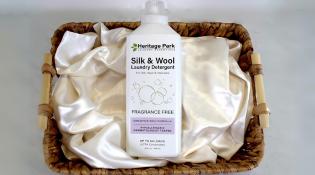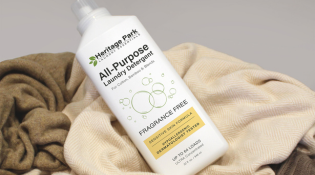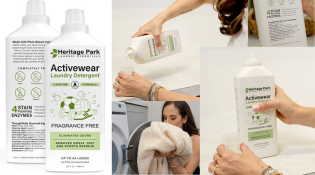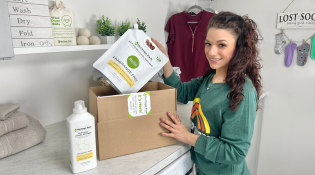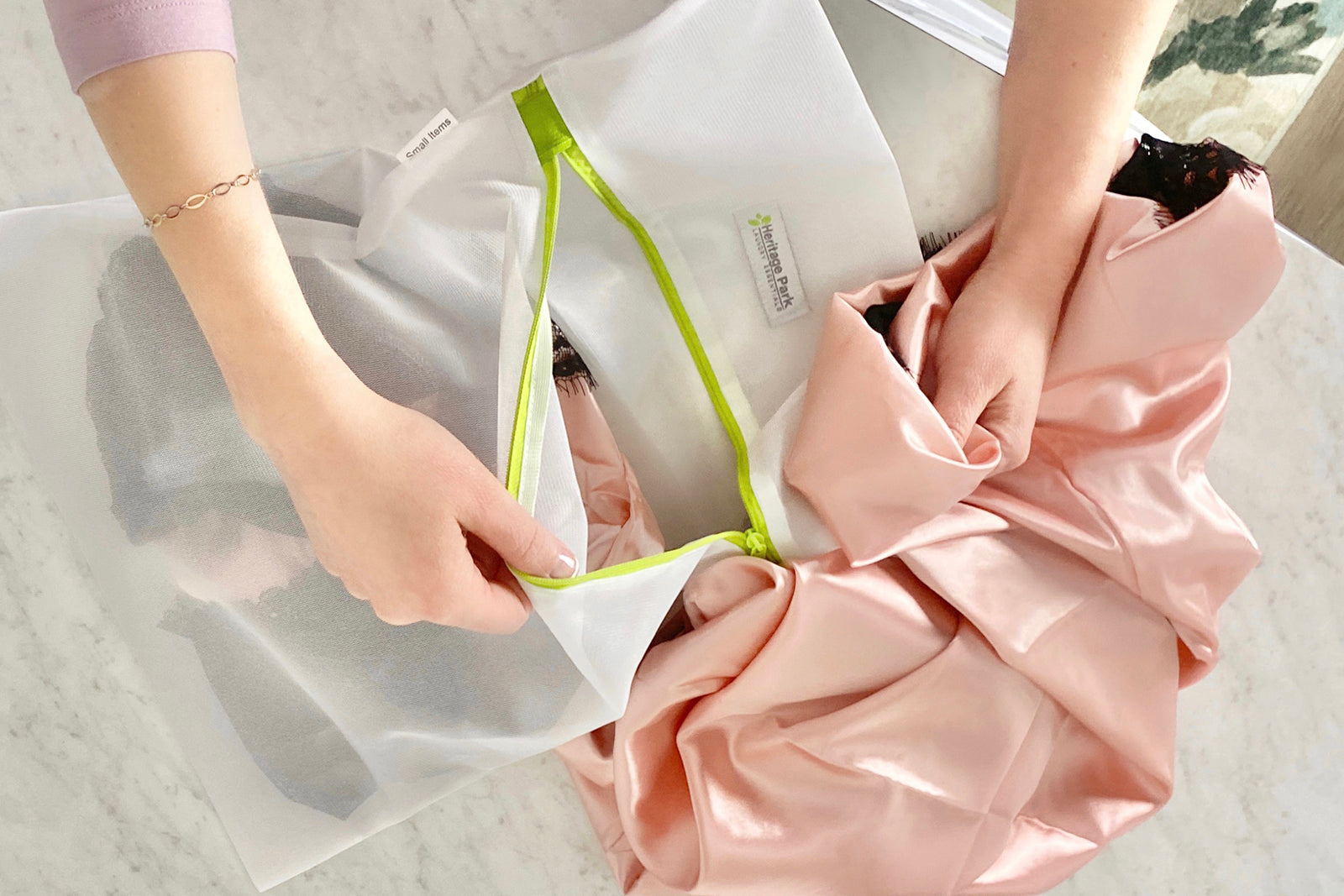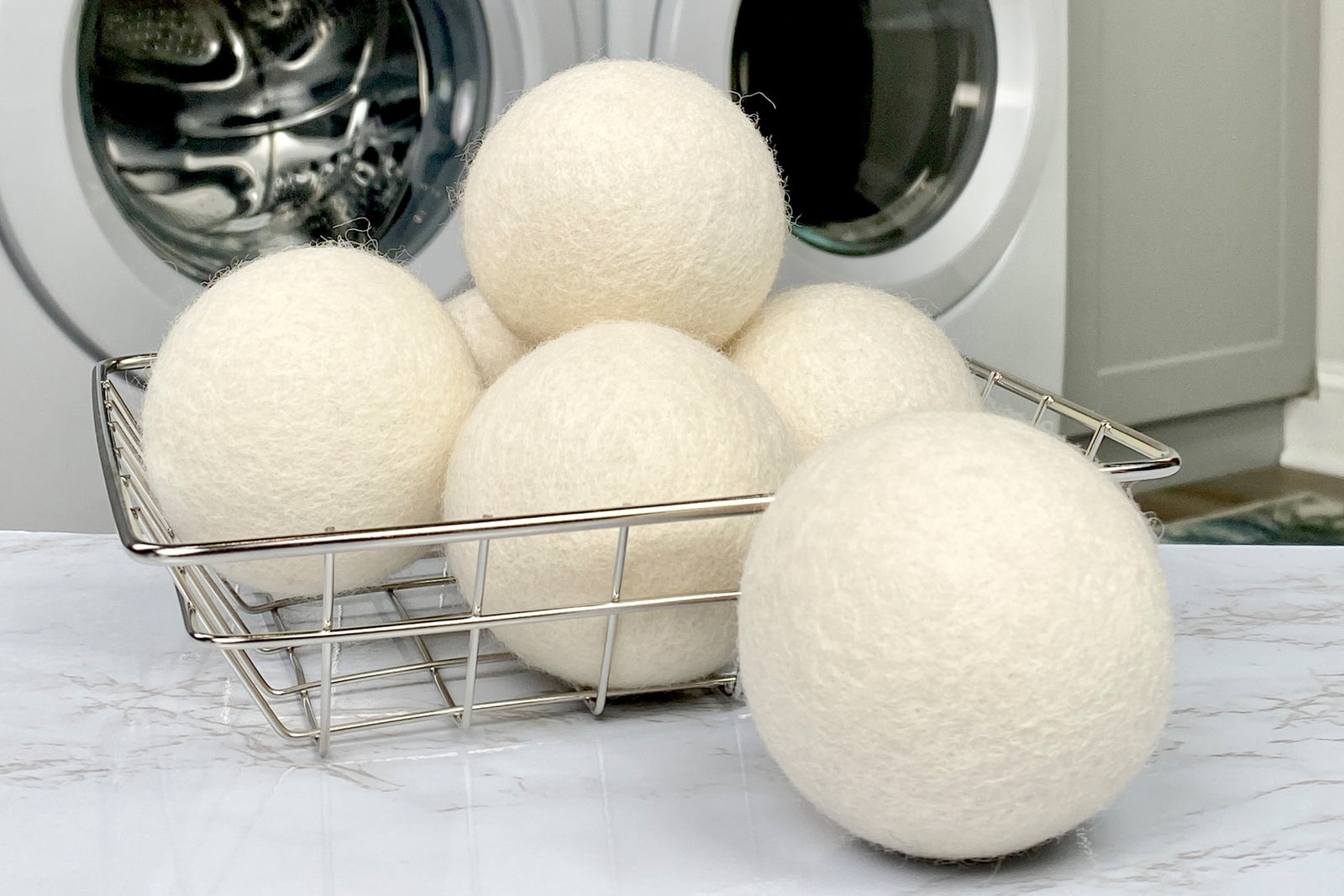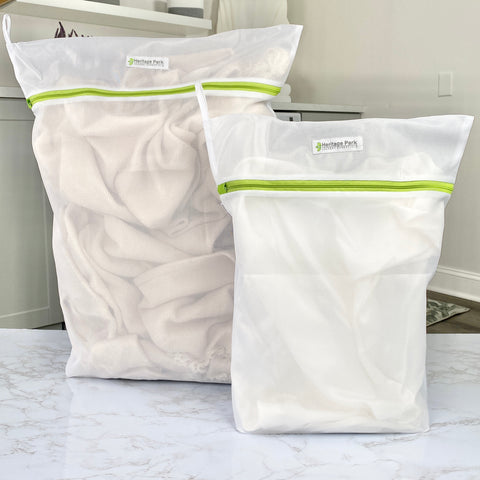Wool is a special fabric that requires special care. If your wool is washable, it’s essential to pick a detergent with the right cleaning and protective properties. This article outlines the benefits of using a wool detergent and offers care tips for your washable wool.
Inside this Article:
- Washing Wool: A Special Fabric Deserves Gentle Care
- What is Wool Detergent? And Why You Need It!
- The Benefits of Using Wool Detergent: An Essential for Fabric Care
- Preserves Softness
- Protects Fabric from Damage
- Prevents Shrinking
- Retains Color Vibrancy
- Can Help with Allergies
- How to Choose the Right Wool Detergent: Important Criteria
- Transform Your Wool Care Routine with These Tips
- Read Care Labels
- Pre-treat Stains
- Avoid Agitation
- Consider a Mesh Laundry Bag
- Use Cold Water
- Dry Flat
- About Heritage Park Laundry Essentials
Washing Wool: A Special Fabric Deserves Gentle Care
When it comes to caring for delicate wool fabrics, not all laundry detergents are created equal. Wool -- which is known for its softness, warmth, and water-wicking properties -- requires special attention to maintain its quality and performance. Some wool fabrics, including garments with a lining, should only be dry cleaned; this is why we always recommend reading the care label.
However, many wool garments and even some blankets and throws are washable either by hand or machine. This is a wonderful convenience for wool-lovers everywhere. However, wool can’t be washed with harsh commercial detergents or even with some gentle stain-removing formulas, either of which have the potential to damage the wool fibers. This is why Heritage Park Laundry Essentials offers our Silk and Wool Laundry Detergent. This specialty formula is made to gently clean and care for wool, silk, and other protein-based fibers.
Read on to learn more about why your fine wool washables need a special detergent and how to use it to keep your woolens clean, fresh, and vibrant.
What is Wool Detergent? And Why You Need It!
Before we explain wool detergent, let’s take a minute to talk about wool fabric and why it needs special cleaning. Similar to silk, cashmere, alpaca, fur, leather, and even feathers, wool is a protein-based fiber. In fact, the protein structure of wool fiber is what provides so many of its wonderful properties, including breathability, warmth, and ability to wick moisture.
That said, many detergents are too abrasive for the protein structure of natural fiber. Commercial detergents should never be used because they contain harsh chemicals. However, even gentle enzyme or biological detergents (learn more about what those are here) should also be avoided. These formulas contain enzyme blends that break down protein-based stains. And while those enzymes work wonderfully on breaking down the enzymes in ketchup or chocolate ice cream from the fabric of your cotton t-shirt, over time the integrity of wool fabric, which is made of protein.
This is why a dedicated wool detergent like Heritage Park Silk and Wool is your best bet. Our formula contains gentle ingredients that preserve the softness and prevent damage to wool while still effectively releasing dirt, stains, and odor.

The Benefits of Using Wool Detergent: An Essential for Fabric Care
Let’s take a closer look at the many benefits of using a detergent made specially for wool and other protein-based fabrics.
Preserves Softness
Harsh commercial detergents can dry out wool and remove its natural moisture and softness. A special detergent like Heritage Park Silk and Wool helps maintain the plush feel of wool to ensure your favorite wool garments and throw blankets stay soft and cozy, even after multiple washings.
Protects Fabric from Damage
As we mentioned earlier, some detergents, including those made with laundry enzymes, can break down the structure of wool fiber. These weaker fibers are more prone to rips, pulls, and pilling.
Prevents Shrinking
Wool fibers have a tendency to shrink when exposed to harsh chemicals and agitation. Wool detergent helps minimize this risk (of course, NEVER put your wool garments or blankets in the dryer).
Retains Color Vibrancy
Wool can hold dye beautifully for strong, vibrant colors. Harsh detergents can cause even high-quality wool clothes to fade. A wool detergent will help your items retain their vibrant color to keep them looking new for longer.
Can Help with Allergies
Many wool detergents -- like Heritage Park Silk and Wool Fragrance-Free formula -- are hypoallergenic. These have been independently tested as non-irritating for individuals with sensitive skin or allergies. It is hypoallergenic and free from harsh chemicals, making it suitable for individuals with sensitive skin or allergies.
How to Choose the Right Wool Detergent: Important Criteria
When selecting a wool detergent, consider the following factors to make an informed choice:
- Gentle Formulation: Look for detergents labeled as “wool detergent” or “delicate fabric detergent.” These are specifically formulated to be gentle on wool fibers.
- No Harsh Chemicals: Learn to love reading labels! To ensure the safety of your woolens, opt for a detergent free from heavy chemicals. Heritage Park Silk and Wool Detergent is made without any dyes, phosphates, sulfates, chlorine, bleach, or brighteners.
- Natural ingredients.Look for a short list of ingredients that you can easily find on the bottle and the company’s website. Our Silk and Wool detergent contains a handful of natural and naturally derived ingredients, and we pride ourselves on transparency. Our products are made in small batches in the USA. You can check out our stewardship guidelines here.
- Enzyme-free.Regular washing with enzymes can damage wool fibers over time. (See below for the rare situation in which it is okay to treat wool with an enzyme detergent).
- A neutral pH: A detergent with a neutral pH is better for fabric and skin. Read about why pH in detergent matters here.
- Concentrated liquid: Liquids are better for washing, particularly when it comes to delicate fabric, because they dissolve better. Also, a concentrated liquid is more environmentally friendly because it contains less water/uses less plastic. Additionally, all of our detergents are biodegradable and safe for greywater and septic systems.
- Versatile. Yes, wool requires a special detergent. But you don’t need to waste money on a wool-only detergent. Our Silk and Wool Detergent works on many different types of protein-based fabric such as silk cashmere, alpaca, down (think pillows and comforters), and more.
- Scent free and hypoallergenic options: Fragrances can sometimes irritate sensitive skin. If you have allergies or skin sensitivities, consider our fragrance-free formula that is certified hypoallergenic. Learn more about hypoallergenic detergent here. For those who prefer a delicate scent, our Silk and Wool detergent is also available in Lavender Mist and Spring Magnolia varieties.
Transform Your Wool Care Routine with These Tips
If you are machine washing wool, wash like colors together in a small, wool-only load on a delicate wash or hand-wash setting. Learn about washing machine settings here.
Read Care Labels
Always check the care labels on your woolen items for specific washing instructions. Some wool garments may require hand washing, while others can be machine-washed on a gentle cycle. (If a wool garment says dry cleaning is needed, take it to a professional and do not attempt to wash).

Pre-treat Stains
If your woolens have stains, pre-treat them before washing. Use a small amount of wool detergent to gently rub the stain, then wash the garment as usual. For a persistent stain, you may use a small amount of enzyme detergent on wool for pre-treating only (test on an inconspicuous spot).
Avoid Agitation
When washing wool in a machine, use the gentlest cycle and avoid excessive agitation. Aggressive movements can cause wool fibers to tangle and lead to felting or shrinking.
Consider a Mesh Laundry Bag
Even a gentle cycle has the potential to tug and tear at wool. If you’re washing a delicate garment, or even small items like wool socks, it’s best to place them in a fine mesh bag to protect them inside the machine.
Use Cold Water
Cold water helps prevent wool from shrinking. Always wash woolens in cold water to maintain their size and shape.
Dry Flat
Never wring out excess water; instead, blot or roll your wool item in a clean dry towel. Then lay flat on a new towel to dry. Avoid hanging wool items, as this can stretch the fibers and distort their shape.
For more information on how to hand wash or machine wash wool, click here. Also check out this blog on how to wash merino wool sweaters and clothing.
Using Heritage Park Silk and Wool Detergent and employing proper washing techniques are essential steps in preserving the beauty and longevity of your wool sweater, a washable wool blanket, or other type of wool clothing. By following the tips outlined in this guide, you can ensure that your wool washables remain soft, vibrant, and cozy for many seasons to come.
About Heritage Park Laundry Essentials
At Heritage Park, caring for fine fabric is our passion. As lifelong collectors of luxury sheets, towels, and cloths, we found many commercially available "gentle detergents" either damaged our fabrics or didn't get the job done, leaving stains. We knew we could do better. So we developed a formula with the perfect balance of powerful -- yet safe -- ingredients designed to remove tough, set-in stains while remaining gentle on luxury linens. Please connect with us at (800) 977-1841 or visit our store or email us with any product feedback or cleaning questions.


